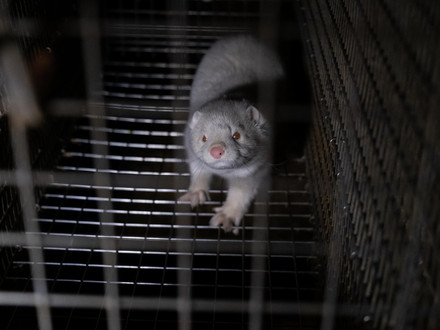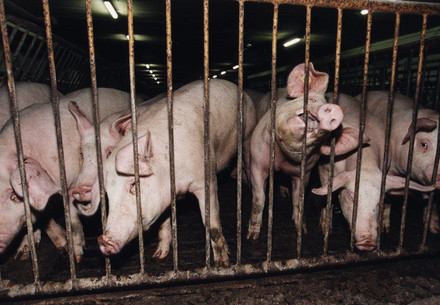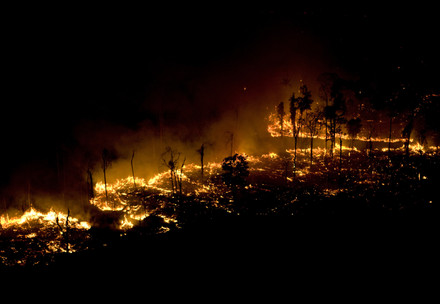Climate and Animal Welfare
An estimated 83.3 billion farmed animals worldwide are slaughtered for meat every year. Animal agriculture makes up around 1/6th of all manmade greenhouse gas emissions. Farming cows for the production of beef and dairy alone causes 2/3th of all global animal agriculture emissions. Factory farming in the meat and dairy industry not only exploits billions of animals but also fuels the climate crisis immensely.
Every Meal Counts
What we eat matters. Every meal has the power to shape the future.
What are the climate campaigns at FOUR PAWS?
As an animal welfare organisation, we are alarmed about the unfolding climate crisis. Therefore, we have various campaigns and projects exposing the harmful practices of the meat and dairy industry that exploits billions of animals, people and our planet and demanding a food systems transformation.
In our Meat Exhaustion day report, we looked at the meat consumption per country. We calculated when a country would exceed its 'sustainable' meat consumption defined by the Planetary Health Diet. This is a reference diet of the renowned scientific EAT-Lancet Committee, which looks into the environmental and health impacts of food.
We frequently attend climate strikes and protests related to animal agriculture in countries all around the globe.
Our policy experts also make sure to give a voice to the animals in political settings like the UN Climate Conferences or the European Parliament.
How is animal agriculture harming the climate?
Cows, sheep and other ruminants emit a very powerful greenhouse gas called methane. This happens through a process called ‘enteric fermentation’ that occurs in their stomachs and intestines when digesting grass and other feed.
Also, the feed production itself is quite climate-harming. Almost half of farm animal-related emissions are caused by the production and processing of animal feed such as grass and feed crops.1 Feed production and grazing pastures alone take up 77% of the world’s agricultural land.2
The manure of ruminants but also pigs for example also releases greenhouse gas emissions, especially nitrous oxide. This gas is 273 times more potent than CO2. Manure alone makes up 13% of all nitrous oxide emissions. An additional 54% of all nitrous oxide emissions come from urine and dung from farmed animals kept on pastures or rangeland.3 Making animal agriculture, by far the biggest emitter of nitrous oxide.
How exactly do cows emit methane?
Well, cows are ruminants, just like sheep and goats. A process called ‘enteric fermentation’ that occurs in their stomachs and intestines when digesting feed, contributes to greenhouse gas emissions as it releases methane (CH4). Ruminants are responsible for 89% of the total CH4 emissions of animal agriculture, while animals like chickens and pigs contribute only 11%. Among ruminants, cattle contribute to the majority of methane production at 69% of the total.4
Therefore, emissions from farmed animals are the largest source of agricultural emissions with enteric fermentation being the predominant process and cattle the main animal causing these emissions.
So, are cows killing the climate?
No. According to the FAO, farmed cattle (raised for both beef, milk and inedible outputs like manure and draft power) are the animal species responsible for about 62% of animal agriculture’s emissions.5 However, it is us humans that breed these animals for our consumption. We simply keep too many farm animals. The ones to blame for the climate crisis are meat and dairy giants as well as politicians who are ignoring the harmful impacts of factory farming to animals and the planet.
Note: Any advertisements that may appear during the viewing of this video are unrelated to FOUR PAWS. We assume no liability for this content.
Learn More about the Climate
Source
2. United Nations Environment Programme. What’s Cooking? An assessment of the potential impacts of selected novel alternatives to conventional animal products. United Nations Environment Programme; 2023. https://wedocs.unep.org/20.500.11822/44236. doi:10.59117/20.500.11822/44236
3. Dangal SRS, Tian H, Xu R, Chang J, Canadell JG, Ciais P, Pan S, Yang J, Zhang B. Global Nitrous Oxide Emissions From Pasturelands and Rangelands: Magnitude, Spatiotemporal Patterns, and Attribution. Global Biogeochemical Cycles. 2019;33(2):200–222. doi:10.1029/2018GB006091
4. FAO. Pathways towards lower emissions. FAO; 2023. http://www.fao.org/documents/card/en/c/cc9029en. doi:10.4060/cc9029en
5. FAO. Pathways towards lower emissions. FAO; 2023. http://www.fao.org/documents/card/en/c/cc9029en. doi:10.4060/cc9029en













